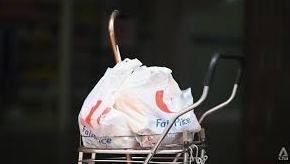New measures aim to combat waste and enhance recycling efforts.
SINGAPORE: A new Bill to enforce a plastic bag charge at supermarkets and introduce a beverage container return scheme was presented for its first reading in Parliament on Monday (Feb 6).
The Resource Sustainability (Amendment) Bill aims to cut down on packaging and food waste while promoting behavioral changes in Singaporeans to enhance recycling efforts, according to a joint statement from the National Environment Agency (NEA) and the Ministry for Sustainability and the Environment (MSE).
These initiatives will support national goals outlined in the Singapore Green Plan 2030 and the Zero Waste Masterplan, which include reducing daily per capita waste sent to landfills by 30% and increasing the national recycling rate to 70% by 2030. The measures will also help prolong the lifespan of Semakau Landfill.
The disposable carrier bag charge was initially announced during the Committee of Supply debates in March last year. It will apply to all types of disposable carrier bags and is set to take effect in mid-2023.
To ensure accountability and transparency regarding the proceeds from the charge, supermarket operators will be required to disclose the number of bags issued, the total proceeds collected, and how these proceeds are utilized, including support for charitable or environmental initiatives.
Minimum Charge of Five Cents
Supermarkets with an annual turnover exceeding S$100 million will need to impose a minimum charge of five cents for each disposable carrier bag provided to customers. This requirement will initially affect around two-thirds of all supermarkets in Singapore, including major chains such as NTUC FairPrice, Cold Storage, Giant, Sheng Siong, and Prime.
Packaging waste represents about one-third of domestic waste, with plastics making up approximately 60% of that. In 2021, a mere 6% of plastic waste was recycled.
The proposed beverage container return scheme will involve a small deposit applied to certain pre-packaged drinks, which consumers can redeem by returning their empty containers at designated collection points. This scheme was first mentioned during the 2021 Committee of Supply debate and was expected to launch in 2023, but its timeline is under review due to industry feedback, as noted by Senior Minister of State for Sustainability and the Environment Amy Khor in April 2022.
“This initiative will enhance zero waste efforts by encouraging recycling habits among Singaporeans and ensuring a steady supply of clean, high-quality recyclables,” stated the NEA and MSE. Increasing the quantity and quality of recyclables collected will bolster the development of Singapore’s recycling industry.
The proposed amendments will also establish a framework for reporting food waste. In 2021, Singapore generated 817,000 tonnes of food waste, with only 19% being recycled. Commercial and industrial sectors are responsible for about 40% of the food waste generated annually. From next year, owners and operators of industrial and commercial facilities generating significant food waste will be required to separate this waste and report the amounts for treatment.








